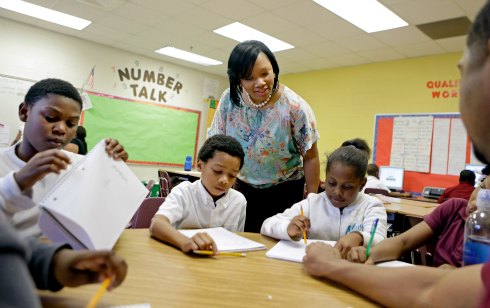
Long after the school day ends, nearly half the students enrolled at Burgess-Peterson Academy in Atlanta spend an extra four hours in class looking to hone their math and reading skills by using such items as a deck of cards for subtraction problems and staplers and crayons to practice taking measurements.
While this Atlanta public school wasn’t ensnared in a massive cheating scandal that led to criminal charges against the district’s former superintendent and 34 other educators, it’s a sign of the intensive work being done across the district to remediate children affected by allegations of forged test scores, as well as those who have simply fallen behind.
”It is clear that students were deprived of services that they should have received if their test scores had been adequately and appropriately recorded,” Atlanta Public Schools Superintendent Erroll Davis said in a recent interview.
”We certainly have a larger than average percentage of people not performing at the appropriate levels, and those are the students we are trying to get into our remediation programs and those for which we are designing programs on an ongoing basis.”
With state standardized tests beginning in Atlanta on Tuesday, teachers are anxious to find out how their students are progressing. One recently told Burgess-Peterson Principal Robin Robbins he feared three of his students may not pass. She reassured him, telling him to focus on how much progress they had already made in his class.
”The wider the gap, the harder it is,” Robbins said. ”So that’s why we really spend a lot of time working with students early on. Kindergarten, first grade, if you see the gaps, then you need to attack them then. If not, they are going to grow larger and larger, and before you know it, the graduation rate is the way that it is.”
At Burgess-Peterson, specialized teachers are brought in to drill students on math and reading concepts, with students moving to different classrooms to provide a physical break from the regular school day.
On a recent Friday, second-graders were moving among ”rotation stations” using flash cards, a deck of cards and dice to work out math problems involving subtraction.
Upstairs, third-graders were broken into small groups with a few working math problems on a bank of computers along the classroom wall and others in two groups working closely with a teacher and a teacher’s aide. Meanwhile, three girls sat on the floor practicing their measurements using a stapler, crayon and sticky note.
Robbins said the classroom was emblematic of instructional learning focused on targeted needs.
”We don’t do a lot of skill and drill,” Robbins said. ”We try to engage the students.”
The costs of the remediation program have been estimated at $4 million for a district with just over 51,000 students and an operating budget of $574 million for the 2013 fiscal year.
”It’s driven by instructional programs, not just after-school care for students. It’s not just homework help,” said district spokesman Stephen Alford.
The remediation efforts are just one step the school system, which includes 93 traditional and 13 charter schools, has taken in the wake of the cheating scandal.
Besides removing some 180 educators accused of cheating and installing 60 new principals, the district launched mandatory, annual ethics training. Under the policy, every employee has to take an online course and pass a written test covering everything from falsifying an expense report to changing students’ answers on a test. Employees who do not receive 100 percent on the test have to repeat the course until they do.
The training was initially implemented by former Superintendent Beverly Hall, who is among those facing charges, though Davis added the test and made it mandatory for all employees, Alford said.
Other steps include installing ”automatic trigger points,” which use technology to identify test scores that are higher or lower than expected. The district has also recruited an employee at each school to take on the role of ”ethics advocate” to ensure employees have the resources and support they need on ethical issues.
As for Davis, a former university system chancellor initially hired for three months as interim superintendent, he’s focused on working through the challenges facing the district and making plans for a permanent replacement to take over sometime next year.
”I believe there is still a lot of work to do,” Davis said. ”I believe, however, that we are putting the system on a clear path with a clear plan that the next superintendent coming in will not have to reinvent the wheel. That superintendent will not have to discover, as I did, the depth of the problems and the challenges that we have.”
